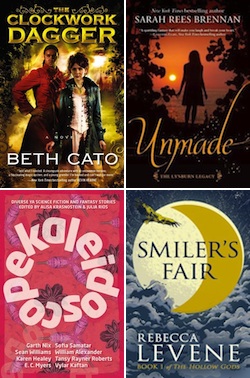So here we are again, as summer slides towards autumn in the northern hemisphere. Another week, another column. Let me know if you guys are getting bored or anything with all this talk about books: I’m sure I could find a controversy to stick my oar in on if I really tried…
(On second thought, let’s not.)
So, books! Let me tell you about some more of them! Specifically, let me tell you about four titles marketed as Young Adult, and one book aimed at a slightly different audience…
The Clockwork Dagger is Beth Cato’s first novel, a second-world steampunk Young Adult adventure. Octavia is a medician—a healer who uses both magical powers as well as mundane skills to treat the sick. She’s en route by airship to her first independent job, in a village alleged to be struck down by poison in the aftermath of the late war. But her fellow travellers are hiding any number of secrets, from her widowed roommate—who might be part of the reason for the war—to the dashing steward—who might just be a spy. When someone starts trying to kill Octavia (and her roommate), she’s thrust into a high-stakes game with no idea who she can trust. The enclosed environment of the airship gives this at times an almost claustrophobic feel, and although the world (and the characters’ relationships) is so far sketched in broad strokes, it holds a lot of promise.
Unmade is the conclusion to Sarah Rees Brennan’s Lynburn Legacy trilogy—Unspoken (2012), Untold (2013), and Unmade (2014)—and when it arrived through my letterbox I knew the time had come to catch up on the middle book. I’d been saving it since it came out, waiting for book three, because Unspoken ended on an emotionally brutal cliffhanger—and a stunning piece of setup for the next book. I didn’t want to wait a year on an even worse cliffhanger…
Untold and Unmade continue the story begun in Unspoken. The English country village of Sorry-in-the-Vale has a dark secret: its family of local gentry, the Lynburns, recently returned after some decades’ absence, are sorcerers. More than that, one of the Lynburns is a sorcerer who gains his power through blood and death and suffering, and the only people who seem to want to oppose him are Kami Glass (budding journalist) and her friends—friends whose relationships and lives are unravelling and becoming more complex by the day.
This is, on the whole, a fantastic trilogy, one that very much sticks its dismount. Full of real, human, messy relationships and friendships, implausibly good banter, and real heroism, I can recommend it wholeheartedly.
I can also wholeheartedly recommend Kaleidoscope, edited by Alisa Krasnostein and Julia Rios. This anthology came into being as the result of a fundraising campaign to create a collection of Young Adult SFF stories featuring diverse protagonists, and it more than fulfils that mandate. The quality is consistently high: two of the stories, of twenty, end on what for me feel like weak notes but which I can see would be open to different readings, while several—like Amal El-Mohtar’s “The Truth About Owls” and Alena McNamara’s “The Day The God Died”—are stories I keep returning to since I’ve read them, to consider them again and again.
The last book I want to draw to your attention is a book I wish I’d been able to enjoy more while reading it: Rebecca Levene’s Smiler’s Fair. In terms of worldbuilding, it has an interesting set-up for the start of a fantasy series, and its characters are novel variants on types that crop up with reasonable frequency in the epic fantasy subgenre: the solitary warrior, the knowledgeable wizard, the village boy with a destiny, and so on. But three-quarters of the novel seems rather more like prologue than progress: it is only rather late in the narrative, as these things go, that there is any sense of things coming together towards an intended goal, thematic argument, or arc. Smiler’s Fair is heavy on the male characters, light on the female ones with significant page time, and in general it seems fairly conservative as genre epic fantasy qua epic fantasy. I may be a demanding reader, when it comes to epic. (Justin Landon liked it rather more, for a different take on the matter.) Has anyone else read Smiler’s Fair and has thoughts they’d like to share?
What exciting new books are you folks reading?
Liz Bourke is a cranky person who reads books. Her blog. Her Twitter.










